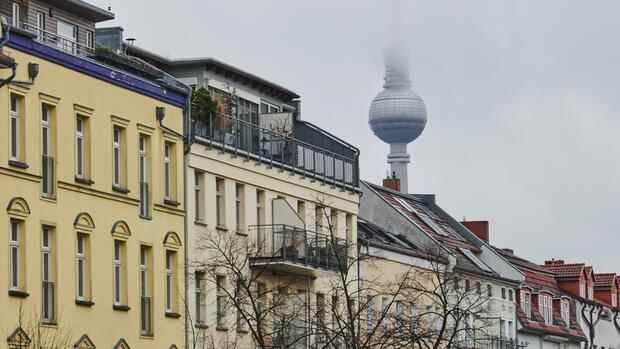Prices in Berlin rose particularly sharply.
(Photo: dpa)
Frankfurt Are rents in major German cities continuing to rise or not? The experts at the online platform Immoscout24 paint a mixed picture. In the past year, rents across Germany – measured by the offers placed on Immoscout24 – have risen at least more than in 2020.
And in the next twelve months it will continue to go up. However, only by three percent, the online portal forecasts based on an evaluation of various parameters such as the development of supply and demand on its platform, the development of the population, income and construction activity. “Demand continues to exceed supply many times over,” says Immoscout24 Managing Director Thomas Schroeter. “For many people searching, it is still difficult to find a suitable apartment.”
Specifically, the landlords on the online platform for apartments that were built more than two years ago demanded an average of 4.1 percent higher rent in 2021 than in the previous year. For new apartments, the nationwide increase was seven percent. In the previous year, an increase of 3.5 percent and 5.8 percent was recorded.
Currently, the national average rent for newly rented apartments is 7.33 euros per square meter. The reference apartment with two rooms and 70 square meters – which corresponds to the most frequently searched for parameters by tenants – costs around 513 euros net. Newly built apartments are offered for new leases on Immoscout24 for an average of EUR 10.07 per square meter.
Top jobs of the day
Find the best jobs now and
be notified by email.
Despite significant increases, Berlin lags behind other metropolises
But of course there are big differences in the seven largest cities in Germany. Prices rose particularly sharply in Berlin: the rent for existing apartments went up by six percent – with a price per square meter of 10.59 euros, Berlin even overtook Düsseldorf, where the price per square meter is 10.38 euros.
Despite this, Berlin is still one of the cheapest metropolises for renters. You have to calculate an average of 741 euros net for the reference apartment in the federal capital.
A sum that Munich residents can only dream of: you have to spend about 1139 euros, the current price per square meter is 16.30 euros. Despite the price level, which has been high for years, rents in Munich rose by 3.5 percent in 2021 compared to the previous year.
The lowest rent increase among the metropolises was recorded in Stuttgart in 2021. Existing apartments were offered here with a rent that was 1.7 percent more expensive. In Düsseldorf and Hamburg the surcharge was 2.9 percent, in Frankfurt 4.5 percent and in Cologne 5.4 percent. The rents demanded for new buildings have risen even more significantly than the prices for existing apartments.
Recommendation: From Berlin to Cottbus
And it won’t get cheaper in the next twelve months if the forecasts by Immoscout24 come true: growth of eight percent for existing and seven percent for new rental apartments is predicted for Berlin, and an increase of three percent in both segments for Cologne.
It should only go up by one percent for both older and new apartments in Hamburg and Frankfurt. In Munich, the experts expect stagnation in existing buildings and a slight increase of one percent for new buildings.
In view of such numbers, the experts from Immoscout24 have a recommendation ready: In the surrounding cities, the price level is much cheaper. So if you move from Berlin to Cottbus – and thus calculate a commute of more than an hour and make friends with life in a city of 80,000 inhabitants – you can almost halve your rental costs for the average apartment at 394 euros per month. Ratingen is recommended for thrifty residents of Cologne (possible savings: 180 euros), for Frankfurt Kaiserslautern (372 euros).
More: Experts expect poorer credit conditions after the decision of the financial regulator
